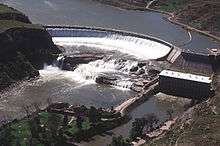Big Bend Dam


Big Bend Dam is a major rolled earth dam along the Missouri River in central South Dakota.
The dam, 95 feet (29 m) high and 10,570 feet (3,220 m) in length, was constructed as part of the Pick-Sloan Plan for Missouri watershed development authorized by the Flood Control Act of 1944. Construction began in 1959 and the embankment was completed in July 1963. Power generation began at the facility in 1964 and the entire complex was completed in 1966 at a total cost of $107 million. The hydroelectric plant generates 493,300 kilowatts of electricity at maximum capacity, with an annual production of 969 million kilowatt hours,[1] and meets peak-hour demand for power within the Missouri River Basin.
Located near Fort Thompson, South Dakota, just south of a major bend in the Missouri River (from which the dam takes its name), Big Bend Dam creates Lake Sharpe, named after South Dakota Governor Merrill Q. Sharpe. The lake extends for 80 miles (130 km) up the course of the Missouri River past Pierre to Oahe Dam, another major power-generating and flood control embankment. Lake Sharpe covers a total of 56,884 acres (23,020 ha) and drains an area just under 250,000 square miles (650,000 km2).
The construction of the dam in the 1960s resulted in the dislocation of people on the Crow Creek Reservation. The flooding also resulted in the loss of limited plant life resources used by these people for food and medicine.
A monument at Big Bend Dam dedicated in 2002, the Spirit of the Circle Monument, honors the more than 1,300 people who died over a three-year period in the 1860s at the Crow Creek Reservation near the present site of the dam.[2]
For the first time in the dam's history, the Army Corps of Engineers opened the dam's spillways on the morning of June 3, 2011. In June 2011, in response to the 2011 Missouri River Floods, the dam was releasing 150,000 cubic feet per second (4,200 m3/s), which greatly exceeded its previous record release of 74,000 cu ft/s (2,100 m3/s) set in 1997.[3]
References
- ↑ "Summary of Engineering Data – Missouri River Main Stem System" (PDF). Missouri River Division. U.S. Army Corps of Engineers. August 2010. Retrieved 2012-08-17.
- ↑ Melmer, David (June 19, 2002). "Dakota sacrifice honored". Indian Country Today. Retrieved 2008-09-27.
- ↑ "Missouri River Mainstem Reservoir Bulletin" (pdf). Army Corps of Engineers. Retrieved 18 June 2011.
- Janson, Donald (May 30, 1960). "6th Missouri River Dam Begun; Last in Flood-Control Network; Big Bend Project Scheduled for Completion in 1963 -- Johnson Urges Others. 6th Dam Started on Missouri River". The New York Times. Retrieved 2008-09-27.
External links
- Big Bend Project Homepage - U.S. Army Corps of Engineers
Coordinates: 44°02′58″N 99°26′55″W / 44.049473°N 99.448586°W
